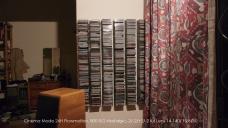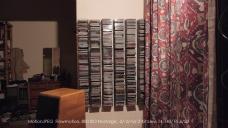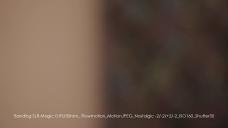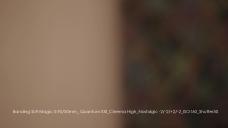
-
"So emotional. Who's attacking MJPEG or the hack? I am fucking sick and tired of you guys blowing stuff up into a shit storm. If you can't be rational then go somewhere else."
Read your own posts, Andrew. You have been attaching, and in a most unpleasant way. If you're ready to get constructive, welcome back. -
From my personal perspective it would seem that the AVCHD path has more life to it. I'd be more interested in seeing how far that it can be improved upon. It looks to me to be starting from a better quality position and that's very important to me.
Perhaps from my novice eyes the MJPEG seems to be about a stop brighter to me than the AVCHD clips EOSHD provided. Overall tho I didn't like the noise as much on the MJPEG clips. I'd be very interested to hear more tricks that can be done to fool the AVCHD into providing more detail in low light. -
> I'd be very interested to hear more tricks that can be done to fool the AVCHD into providing more detail in low light.
We must understand AVCHD encoder better to do this. -
Re: whether or not the LPowell 1080P MJPEG patch is "upscaled 720P" or not- couldn't some tests be done with resolution charts to figure that out once and for all?
Vincent -
@Vincent: Take a look at Matt's last comment.
-
"So emotional. Who's attacking MJPEG or the hack? I am fucking sick and tired of you guys blowing stuff up into a shit storm. If you can't be rational then go somewhere else."
Hello...My name is Pot...and you are a black Kettle...
This acrimonious debate is very distracting...and pointless. If everyone had the same opinion on everything it would be pretty boring indeed.
I use AVCHD about 99 percent of the time. Along comes a new patch for a new camera (for me anyway) which greatly improves how MJPEG looks. Surely it's up to each user to decide on the advantages and disadvantages (as personally perceived) and use the codec/bitrate/camera he thinks best for the situation.
For example, as far as I'm concerned AVCHD in the GH2 is currently unusable FOR WHAT I DO because of the start-up glitch. 100mbps MJPEG (and particularly 30p) is very usable FOR WHAT I DO ...end of fucking drama...FOR ME. -
It seems with the latest PTools that MJPEG quality is better than before especially in 4:3 mode. My main point was that MJPEG was not a low light killer. What I do find interesting is how Vitaliy has got the better quality out of 4:3. The first time I tried it with the first PTools release it looked like upscaled VGA and now when I put it to 1440x1080 for example it actually looks pretty damned close to 1440x1080.
Yes the 1920x1080 detail is not quite 1080p but it is an improvement. Thanks Vitaliy. -
cosimo_bullo: Matt says he sees more details than 720p, but "not much though", and to come to that conclusion he says he downscaled a SCREENSHOT from a 1080P MJPEG video to 720P then upscaled said screenshot to 1080P... I'm sorry, but what the heck does that prove?
My question was and still is, why doesn't somebody on EITHER SIDE of this debate actually do a real test using a resolution chart shooting natively in both modes?
Vincent -
"The first time I tried it with the first PTools release it looked like upscaled VGA and now when I put it to 1440x1080 for example it actually looks pretty damned close to 1440x1080."
So has something changed/ been improved in 4:3 MJPEG mode from the 1st PTools to the current version? If so this is great news!
-
@Vincent. We will have a chance to do just that (or close to that) this weekend. In production this week with cameras tied up. I could try to find the couple of A/B tests I did with AVCHD and MJPEG at 1920/1080 but you're right, a res test would be best.
-
>"The first time I tried it with the first PTools release it looked like upscaled VGA and now when I put it to 1440x1080 for example it actually looks pretty damned close to 1440x1080."
with that sort of resolution difference, it should be quite obvious to see if VGA is upscaled. Could someone post some snapshots from a 1440x1080 MJPEG video ? -
It's about Avchdism against Mjpegism and their repective video worshippers & -deities...
Vitaliy spoke already about a crusade!
-
I tend to agree with EOSHD's earlier points. I haven't touched the MJPEG video modes since I bought my GH2. It's largely a "toy" codec that finds its way into low-performance electronics that wanted to add "hd video capture" as a bullet point on the package. The GH2 is a prosumer camera, so yeah it has some consumer-grade elements on there but it makes little sense to use them when there are superior AVCHD modes available.
If you want to send mom a video of your pet turtle riding a unicycle...MJPEG all the way....but did you really spend $2K+ on the GH2, lenses and support equipment just to record glorified webcam-quality video? If you are shooting video and care for quality, sticking with any of the AVCHD video modes would serve you better than the tweaked MJPEG modes. I should point out that AVCHD at AQ2 with 66 or 132m bitrates does well in low light motion and shadows...and that is something that has been tested by other members on here already. -
@WeBcYtE>If you are shooting video and care for quality, sticking with any of the AVCHD video modes would serve you better than the tweaked MJPEG modes.
Not so the GH1:-) -
Sorry, no resolution chart but my CD-Collection. Stills were exported using mpegstreamclip. In the AVCHD Stills, Gamma was raised for better comparison. I guess, if I used the soft SLR-Magic 0,95 instead of the 14-140 lens kit for the "sharpness test", the difference in sharpness would be unnoticable. Not noticable in the stills but more noticable in the moving image: Lesser "mudding" in dark areas (I hope it is the right term) and lesser banding with MJPEG, I guess because of more noise? A sharper MJPEG with spanning (recording stops after 2:47mins/1.99gb on Sandisk SDXC Extreme Pro/64gb) and with better audio (seems to be restricted to PCM with 16kHz sampling frequency) MJPEG would be heaven to my eye. All the best, Frame

 SharpnessAVCHD.jpg1920 x 1080 - 2M
SharpnessAVCHD.jpg1920 x 1080 - 2M
 Sharpness MotionJpeg.jpg1920 x 1080 - 1M
Sharpness MotionJpeg.jpg1920 x 1080 - 1M
 Noktor_MJPEG_Flowmotion-1.jpg1920 x 1080 - 877K
Noktor_MJPEG_Flowmotion-1.jpg1920 x 1080 - 877K
 NoktorAVCHDQuantum100.jpg1920 x 1080 - 834K
NoktorAVCHDQuantum100.jpg1920 x 1080 - 834K -
According to cbrandin's recent investigations, the AVCHD encoder's highest quality quantization factors used for shadow detail are around 18-20.
Is this information still accurate? Is there any thing that limits the IQ that can be achieved by low luminance regions (putting noise aside).
-
That's not quite right. Depending on matrices, the effective QP can be much lower (lower is better). Going lower than 5 is a waste (because that's for 10-bit, not 8-bit). The new "soft" matrices produce an Effective QP of 5 (for DC value) in many cases, which is ideal, when the PTool quantization parameter is set to 18. Other settings can achieve this too. You can determine the minimum effective QP value by using the JM-SP decoder in StreamParser. The DC value is the lowest effective QP value for each frame. Basically, the quantization parameters by themselves are meaningless because they are processed with matrices to get the final, effective QP - which is what is important.
Howdy, Stranger!
It looks like you're new here. If you want to get involved, click one of these buttons!
Categories
- Topics List23,964
- Blog5,723
- General and News1,342
- Hacks and Patches1,151
- ↳ Top Settings33
- ↳ Beginners254
- ↳ Archives402
- ↳ Hacks News and Development56
- Cameras2,361
- ↳ Panasonic990
- ↳ Canon118
- ↳ Sony154
- ↳ Nikon96
- ↳ Pentax and Samsung70
- ↳ Olympus and Fujifilm99
- ↳ Compacts and Camcorders299
- ↳ Smartphones for video97
- ↳ Pro Video Cameras191
- ↳ BlackMagic and other raw cameras121
- Skill1,961
- ↳ Business and distribution66
- ↳ Preparation, scripts and legal38
- ↳ Art149
- ↳ Import, Convert, Exporting291
- ↳ Editors191
- ↳ Effects and stunts115
- ↳ Color grading197
- ↳ Sound and Music280
- ↳ Lighting96
- ↳ Software and storage tips267
- Gear5,414
- ↳ Filters, Adapters, Matte boxes344
- ↳ Lenses1,579
- ↳ Follow focus and gears93
- ↳ Sound498
- ↳ Lighting gear314
- ↳ Camera movement230
- ↳ Gimbals and copters302
- ↳ Rigs and related stuff272
- ↳ Power solutions83
- ↳ Monitors and viewfinders339
- ↳ Tripods and fluid heads139
- ↳ Storage286
- ↳ Computers and studio gear560
- ↳ VR and 3D248
- Showcase1,859
- Marketplace2,834
- Offtopic1,319










